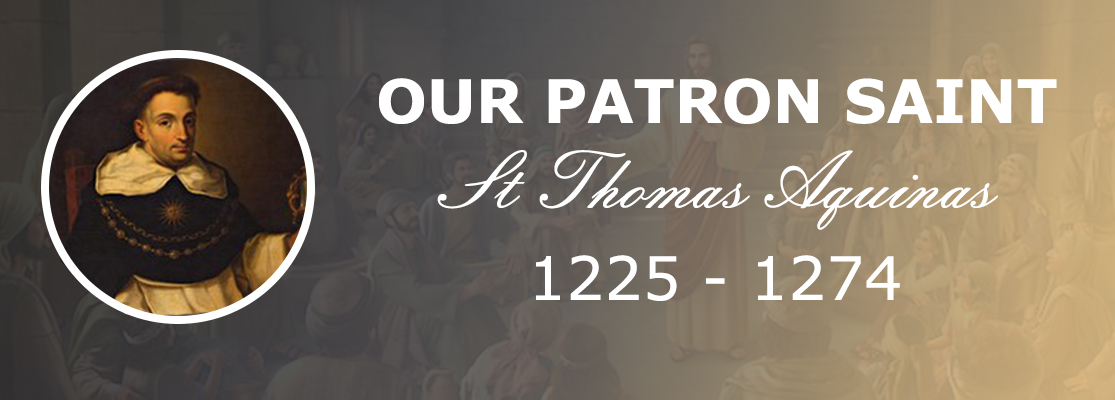
By universal consent, Thomas Aquinas is the preeminent spokesman of the Catholic tradition of reason and of divine revelation. He is one of the great teachers of the medieval Catholic Church, honored with the titles Doctor of the Church and Angelic Doctor.
At five he was given to the Benedictine monastery at Monte Cassino in his parents’ hopes that he would choose that way of life and eventually became abbot. In 1239, he was sent to Naples to complete his studies. It was here that he was first attracted to Aristotle’s philosophy.
By 1243, Thomas abandoned his family’s plans for him and joined the Dominicans, much to his mother’s dismay. On her order, Thomas was captured by his brother and kept at home for over a year.
Once free, he went to Paris and then to Cologne, where he finished his studies with Albert the Great. He held two professorships at Paris, lived at the court of Pope Urban IV, directed the Dominican schools at Rome and Viterbo, combated adversaries of the mendicants, as well as the Averroists, and argued with some Franciscans about Aristotelianism.
His greatest contribution to the Catholic Church is his writings. The unity, harmony, and continuity of faith and reason, of revealed and natural human knowledge, pervades his writings. One might expect Thomas, as a man of the gospel, to be an ardent defender of revealed truth. But he was broad enough, deep enough, to see the whole natural order as coming from God the Creator, and to see reason as a divine gift to be highly cherished
The Summa Theologiae, his last and, unfortunately, uncompleted work, deals with the whole of Catholic theology. He stopped work on it after celebrating Mass on December 6, 1273. When asked why he stopped writing, he replied, “I cannot go on…. All that I have written seems to me like so much straw compared to what I have seen and what has been revealed to me.” He died March 7, 1274.
More than any other theologian, Aquinas shaped how Catholics talk about theology. That statement remains true, even though many theologians rejected his scholastic method as being too formal and not practical enough in the centuries after he died. But the fact that Aquinas became a hero to some and a roadblock to others only solidifies his place as the greatest thinker Christianity has ever produced.
Aquinas was a university professor and Dominican priest who organized the study of theology in the Summa Theologiae, a summary organized by topic. He didn’t invent this method, but many judge him to be the best at it. His great achievement lay in taking all sides of a theological question—like “Can it be demonstrated that God exists?”, but never “How many angels can dance on the head of a pin?”—and reconciling them into one formulaic, authoritative, standard theology text.
His scholastic method of pursuing answers by very carefully laying down questions was revived in the 19th century and influenced a new generation of scholars who, as in his own lifetime, either followed in his tradition or disagreed and tried to come up with alternatives.
But even Aquinas knew he didn’t have all the answers. Shortly before he died, he had a vision during Mass that made him stop writing. Compared to what he’d just experienced, he told his friends, all of his writings were just straw. Even for Aquinas, Christianity was a faith seeking understanding.
To know more about St Thomas Aquinas Click here